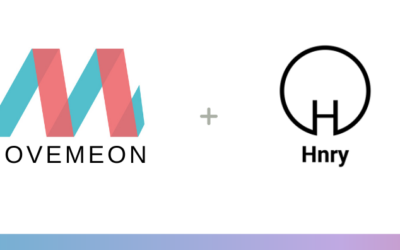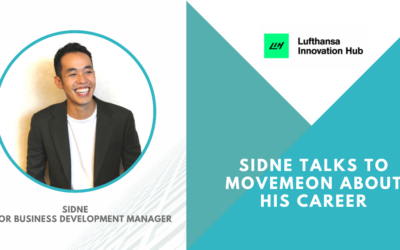May, Founder & Director of Learnitect shares her career journey and her experience using Movemeon.com
Interested in working at Learnitect? Click here to view live roles
—
Could you talk us through your career, please?
Sure – I am ex-Bain. I was at Bain for three years, post my MBA at London business school. I was Case Team Leader there. After Bain, joined EF, which is a global education company. I worked in a digital marketing role there, and subsequently, I started Learnitect. It’s been five years running Learnitect and we essentially provide manager and graduate training to fast-growing companies, mostly startups and scale-ups.
I think it’s quite an unusual career trajectory for a consultant to end up in education. What made you choose that path?
Consulting, like an MBA and university, is a really interesting experience where you have a cohort of peers that you can rely on for support, not only during your time at that organisation or institution but also beyond. I felt like it was a shame that a lot of other companies don’t necessarily have that format of training where people are grouped into cohorts and they go through a special programme together. I wanted to replicate the quality of training you can get in professional services or in an MBA programme, but more tailored to a fast-moving environment like startups and scale-ups.
How has the positioning gone for Learnitect? What’s your way in and how do you sell yourself to them?
I feel like I actually tapped into quite a big startup need. Learning is a huge asset for them as their talent is so business-critical, as you well know as a recruitment company. They’re also hugely busy with growing their business and have huge growth target pressures. While they have resources and probably really good intentions for their teams, and a huge need for their teams to be performing at their best, they don’t necessarily have the bandwidth themselves to maybe build a program from scratch. I think what they’re looking for is a flexible provider of high-quality professional development programmes ready to ramp up as they ramp up, but also flexible towards their changing business needs.
Do you have a single most requested training topic or programme?
The most popular modules are at manager level where the participants are either new managers or new to the company, and is around giving feedback. As a lot of startups and scaleups have a very high performing, but also very friendly and casual culture. People are often managing either friends or at least peers, or even people much more experienced than themselves. As a result, people are often reluctant to offer honest, constructive feedback, and we all know that’s actually hugely powerful in driving your career success. The need for these feedback tools is also increased now that everyone’s working remotely as giving feedback is always so much harder over video.
Have you added any other new training topics about remote working or any of the related challenges?
We’ve seen more interest in the resilience workshop that we do. Otherwise we try to make space as we go through our regular programmes to talk about “How does this translate in a Zoom or audio environment or even asynchronous communication – basically in a remote environment?” We have also created additional space for people to vent and also connect with their peers about the stresses of motivating your team and yourself during a very long period of uncertainty.
How are your trainings run?
I and different members of my team do both the design and facilitation. We get together to build new modules depending on our interest and also our availability. We work flexibly in different combinations, depending on what’s interesting to us.
We are collecting anonymous feedback at the end of every session that we run. I think it’s really helpful and powerful for me to see first-hand how people are responding to it, and also what topics work and also what formats and questions are engaging.
As you can imagine, it used to be face-to-face sessions in small groups – maybe groups of four to eight. We’re hoping that we can build trust and a bond between them so that even after our programme, they feel happy reaching out to each other on a more casual basis. Now the format is virtual so we try to keep groups smaller, maybe four to six, and sessions are live over Zoom calls of two hours – just because any longer and people get a bit tired.
Do you find the consulting and MBA experience helpful in designing courses? Or has your experience at EF been more helpful?
I think consulting was super helpful. It helps me work with different personalities, both in terms of client types and my own team. Also, consulting is very fast paced and very project based. That gives me a strong understanding of the way startups and scaleups work. Additionally, I know what high quality corporate training looks like. That’s the starting point for me to evolve.
When it comes to starting a business as an ex-consultant, what do you think is the most important thing to get, right? Or what’s the key piece of advice you would give to others trying to do the same thing?
I think I would recommend you have some way of testing out your idea, to see whether you’re really enjoying it. Try and have some important, interesting conversations with relevant stakeholders too, before going out on your own – don’t expect to go from zero to 100 immediately.
At the same time, don’t let perfect get in the way of good. Sometimes people want to get the perfect information or wait until a certain threshold before they launch a very comprehensive programme or product. Because they’re working in very high performing environments and have very high standards for themselves and their teams, they’re looking to build an amazing thing before they can launch. Before they think it’s perfect, they’re not even going to try anything. I think that’s a lost opportunity.
Thinking about Learnitect, especially through the pandemic, what has been your favourite part of it, or the thing that you’re proudest of?
I’d like to think that my team and I have done a small part in making people feel more in control at a time when we are all struggling. I think we’ve done a small part in supporting people during a challenging time.
As you think about the next few years, and as hopefully COVID becomes a distant nightmare, what are your plans, or where do you see the business going?
Hopefully just more of the same – bigger clients, more clients. I really think we’ve honed this format for the past five years, and I really like it because you can have really engaging conversations. When we get to take part in these conversations with people who are working really hard, and who are really well-intentioned, we hear very interesting stories and very exciting things that happened in their work lives. Hopefully, we can continue doing that, just more of it!
Over the last year, and rightly so, a lot of companies have turned their attention to diversity and inclusion. How has that been a reflected in the Learnitect curriculum?
Our signature offering, both at the manager level and at the graduate level, includes a diversity & inclusion module already. Having said that, I recognize that it’s a lot more work than one module within a leadership programme. Even before this year, we already had it because I felt strongly that it should be part of a team manager’s mindset. But this year we’re refreshing it, and we’ve worked with different partners on it – I want to build it into a bigger component of the program, but then also experiment with different approaches because it’s a very tricky topic to get right.
Movemeon supports organisations to hire all over the world

Click here for more insight into other organisations hiring on Movemeon.com


